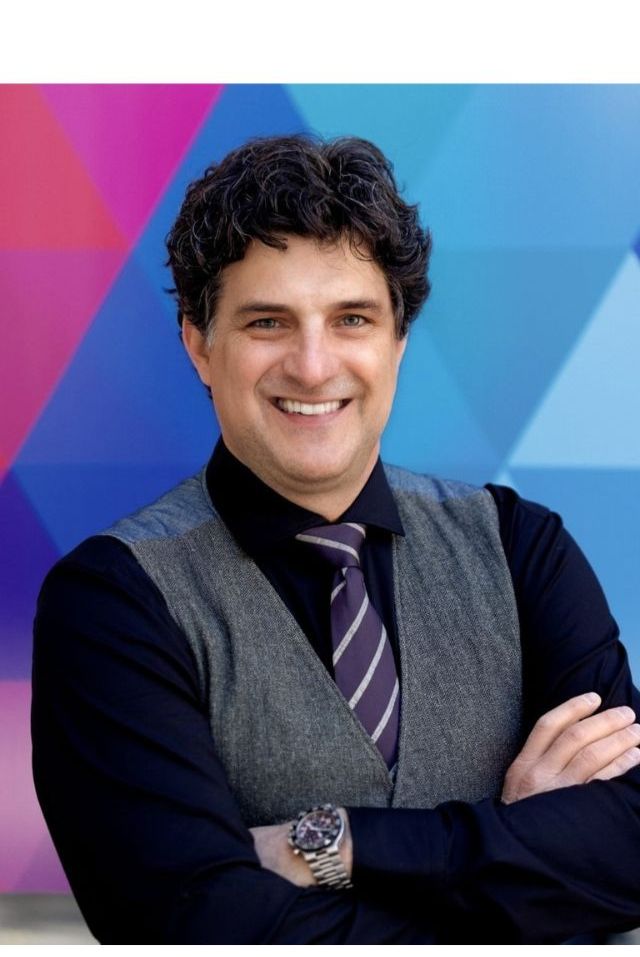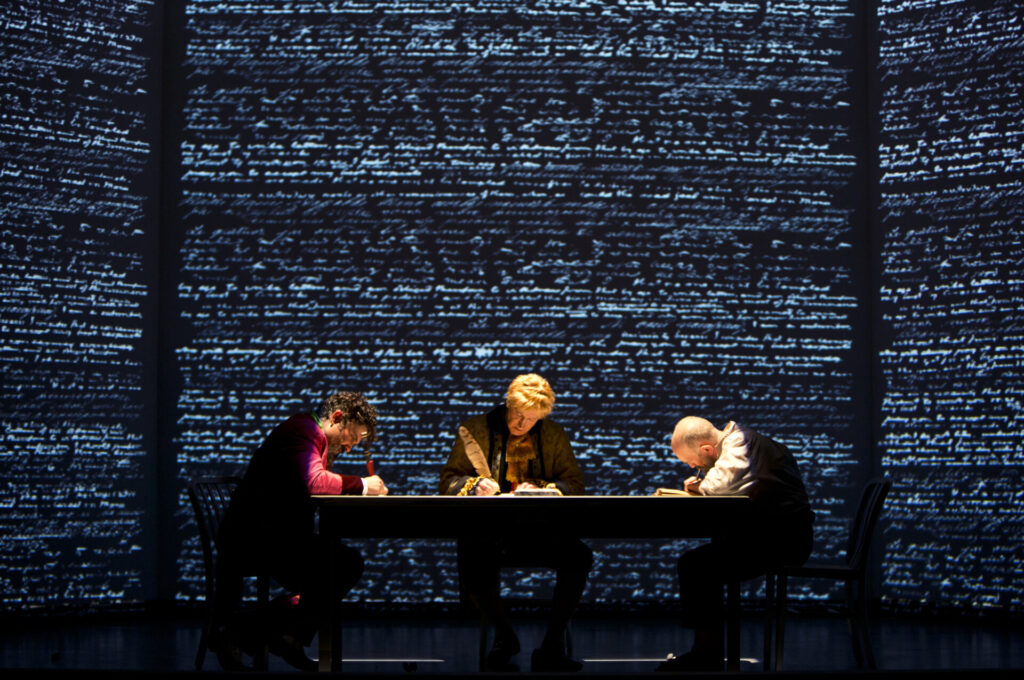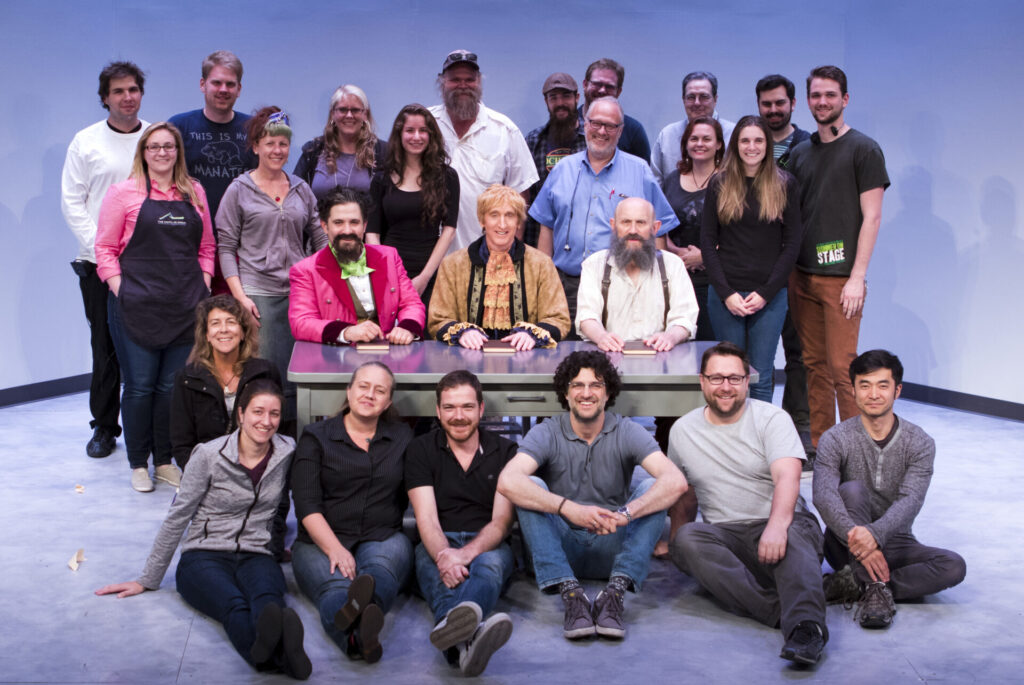
Feature: Matt August Talks New Role As Artistic Director, Programming Future at Arizona Theatre Company
ATC’s new leader is no stranger to directing — or to Arizona, for that matter.
By Robert Encila-Celdran. Originally published by BroadwayWorld.com.
Matt August recalls his first introduction to Arizona Theatre Company as a fortuitous occasion. The year was 2015, a theater season that culminated with a show he directed – the eccentric and lengthily titled three-hander, The Gospel According to Thomas Jefferson, Charles Dickens, And Count Leo Tolstoy: Discord.
August had no sooner capped Discord’s successful run than he received an offer from ATC to direct King Charles III, slated for the following season. On both occasions, August was impressed by the generous support he received as a visiting artist.
No longer a smitten guest, Matt August returns to ATC to take on a more prominent role as the company’s new artistic director, citing enormous gratitude for the organization he has long admired from a distance. He brings a distinguished pedigree that validates his position at the helm, having trained under the aegis of such luminaries as Gordon Davidson of Mark Taper Forum and Jack O’Brien of The Old Globe Theatre. His directing credits are extensive, but two highlights bear mentioning: the regional premiere of In the Heights and the 2006 Broadway production of How the Grinch Stole Christmas, which continues its run in the national touring circuit.
With a brand-new theater season on the horizon, Matt August is eager to implement his training and develop a mixed program of new plays and tried-and-true classics. Below is an excerpt of our recent interview, lightly edited for length and clarity.
BWW: I skimmed through your website the other day and found your body of work quite impressive. I’m curious about your new position as ATC’s artistic director. What makes ATC – and Arizona, for that matter, an attractive place to settle down?
MA: When I came here initially, I was doing the play that sounds like a setup for a joke [Discord]. It was a play that we had done a number of times before that, starting off with a 99-seat theater. The Geffen Theatre came to see it, and we got to redo the production – it wasn’t a transfer, but a redo – and we got to grow the production and extended it 2 or 3 times. David Ira Goldstein (then-artistic director of ATC) had the opportunity to come to LA and see the show, and he invited us to – yet again – not to reproduce it but to grow it. So that was my first experience. We came in with a play that we knew worked but a production that had to be re-scaled to fill a 700-seat theater. The show ended up being technically difficult, and the thing that was incredible was that no one batted an eye. Everything we asked for, everything we needed, we got! There was no sense of, “Well, I’m not sure if we can do that.” There was no hesitation for anything. They gave us incredible support.

BWW: Then you came back to do King Charles fairly immediately, correct?
MA: David Ira asked me to direct the show, which was the first show of the 2016-17 season. It was a huge cast; we used half locals and actors out of LA — and we used students from the university. I brought in my all-time favorite designer, Skip Mercier, who used to be Julie Taymor’s designer. He was my designer on A Christmas Carol and the regional premiere of In the Heights. So I asked him to come and do this — it had just played in London, it had just played in New York, so we had the regional premiere of it. Skip and I approached it like we were doing a Broadway musical. Sets were flying in, and every scene had its own very own unique look. We designed it to have spectacle. We created this very complicated design and a costume palette that had people changing almost every scene. And again — no one batted an eye.
BWW: It sounds like the proverbial match made in heaven.
MA: I kind of fell in love. They were just about to begin a search, and they asked if I was interested in throwing my hat in the ring, so I said, “absolutely.” I grew up under the tutelage of some great artistic directors. I got to really be “in the weeds” with them. So as soon as I walked into these regional theaters, I thought, “This is the bee’s knees. This is it!” All of these theaters had programming that was – you know, sort of your tent poles on the mainstage, your occasional blockbuster musical. On the Second Stage, there was riskier work, new work being developed that might not appeal to a 700-seat audience. I thought that was incredible – you’re doing these blockbuster Broadway musicals, the best of the best plays, and then new work that is exciting and thrilling. And that sort of became part of my DNA as I was thinking about directing.
BWW: One of the things that stood out for me the past two years is the infusion of local artists and people of color in traditionally white roles. Is that a trend you plan to continue under your leadership?
MA: I’ve been on the front line of this conversation almost my entire career. And what I lead with is – you’ve got to put on stage the vision of America that you want or that you’re aspiring to. Every year that we’ve gone out with Grinch – from even when we started doing the workshops in 2005 – what’s great is that we’re a family, we have people that have done it for 10-12 years; it’s a very tight group. And from the beginning, I have arm-wrestled a few casting directors into insanity, saying, “We can’t go out with a company that looks like this because we have to represent everybody. This is a Christmas show that never becomes denominational.” And everything that Dr. Seuss wrote and did was for a civic reason and for pushing a social agenda – pushing a social agenda of democracy, diversity, fairness, and inclusion. And if we are going out with something that doesn’t represent that philosophy, then we’re not going out with the icon that Dr. Seuss is. He has written some of the most basic treatises on inclusion, which every child learns to read on. That is very much at the forefront of every casting conversation that I’ve had.
BWW: What’s your vision for ATC in the next few years?
MA: We’re moving into a new space in Tempe. We’re moving into the Tempe Center for the Arts. And that’s going to present a whole new series of challenges.
BWW: I’m sorry to interrupt, but in Tucson, you’ll remain at the Temple of Music and Art.
MA: Oh, yeah. We’re going to stay here. It will continue to remain our base of operations. We’ve got our shops here; we rehearse the shows here, we tech them here, we open them here.
We’ve got some actor housing here, so we have the ability to bring them in. Housing is a big challenge for us – to be able to have the size of companies we want to have, to put on the shows that we have, and to be able to situate them here and up in Phoenix. One of the things that I want to hit is how we can organizationally build our infrastructure so that we can sustain programming that is operating on those three cylinders that I defined.
We can step in that direction this year with the Latine Playwriting Award (we’re now in our 26th season of giving out that award. I want to develop that into a festival; we’re going to have a festival right before Christmas down here in Tucson. We have a bumper crop of submissions this year, and Elaine Romero spearheads that program. She said we’ve got enough plays for this year’s festival AND next year’s festival.
So next year, I want to double the number of plays and double the amount of festival time. I’m pretty sure we can get some good sponsorship on that and certainly get some great judges in there with some of the artists I’ve worked with over the years. I feel really good about that, and that’s going to be the anchor of our new work development. Then we’re going to do a workshop of a big Broadway-targeted musical that I’ve been working on with two Tony-winning authors. We’re going to workshop that, we’ll present it, and based on the reaction, we’ll look to program that in 2024-25 [season]. So we’ve got our tent pole, we’ve got our new work, and then we’ve got our tried-and-true plays.

BWW: So that’s what goes into creating an entire season of programming, in a nutshell.
MA: Yeah, that’s how I’m sort of thinking about it. You take your risks, you have your sure-fires, and then you’ve got your stuff that requires a lot of support. And I know that on paper, it might look like a fairly conservative lineup of stuff. But Scrooge being a new work (I’m approaching it like it’s a new work because it’s a brand-new script that’s never been done), we’ve got our musical there. But these are all warhorse plays; I think Barefoot in the Park is probably one of the best comedies ever written – and I will defend it. I’m going to do a special pre-show talk about why I think this play has everything: It’s got the Joseph Campbell journey, it has the tension of two different philosophies and two different worldviews, personified and crystallized in – well, anyway, I’m giving away my talk here. But I think that’s really such a genius play. Masterclass (about Maria Callas) – there’ve been a handful of artists that you’ve heard perform, and [you go], “That’s what they mean by a muse. That is a muse. That person is half-divine, half-human.” And to do a play about her – and what the performance demands; what she did to her body and what she did to her life in order to be that caliber of an artist – I mean, that is a genius script. I also have a personal connection to Terrence McNally, and I feel very good that he’s being included in my first season. And I feel the same way about the other two plays as well (Lynn Nottage’s Intimate Apparel and Sam Shepard’s True West).
BWW: Are you directing those shows?
MA: No, I’m not directing those, and we’ve some really good directors coming in. I’m really excited. And we’ll announce who they are shortly.